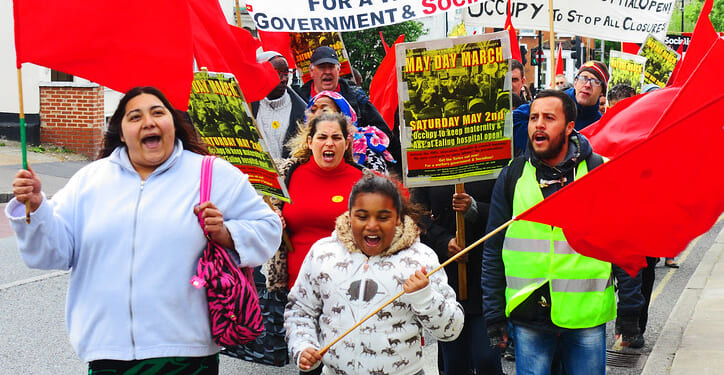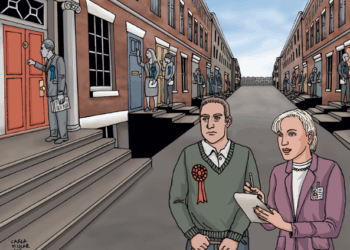Miriam Cates is the former MP for Penistone and Stocksbridge.
“It’s not fair!”
This phrase will be familiar to all parents, everywhere, across all time.
One of the earliest sentiments that a toddler learns to communicate is a sense of fairness, or more often unfairness, protesting when he is told to go to bed, or suspects he has not had as much ice cream as his siblings. But it’s not only children that have a deep desire for fairness; we all do. In fact, fairness is a driving principle in our politics, yet left and right have wildly different interpretations of its meaning.
Last week, three of our party leaders delivered set piece speeches about the economy. In the Chancellor’s budget ‘scene setter’ speech, Rachel Reeves told the nation that “mine will be a Budget for growth with fairness at its heart…” and that “all will have to contribute.”
Implicit in her actions, if not her words, Reeves’ idea of fairness is an ever-growing welfare state, funded by ever-higher taxes on those who work.
The following day, Kemi Badenoch outlined a very different picture of fairness, saying:
“To me, fairness isn’t about the government enforcing equal outcomes. I believe that reward should match effort. If you get up, and go to work, provide for yourself and your family, you should be better off than someone who doesn’t.”
For conservatives, fairness is not an outcome to be achieved, but a set of principles to be followed.
The juxtaposition of these two very different definitions of fairness is a helpful illustration of the dividing lines between left and right. Yet while the philosophical argument may be a live debate, the current state of Britain reveals that, in practice, the left’s socialist vision of fairness has all but won the day.
The principles of socialism certainly have the appearance of fairness.
The idea that our common resources should be equally distributed so that no one has too little and no one too much has a simple, childish logic. And the idea that unequal access to goods and services and even money can be ‘fixed’ by state provision is morally appealing.
Socialism is not wrong to recognise that unfairness exists.
The problem is that, like children, socialists believe that inequality is not an inescapable reality of life but a societal fault that can be fixed, and that the state should assume the role of ‘parent’ in order to fix it. The evidence of the last century proves unequivocally that this theory never works in practice. Socialism can increase the appearance of equality. But eventually it makes everyone poorer, and undermines true fairness by disincentivising the kinds of behaviours – hard work, conscientiousness, risk taking – that are the foundations of a prosperous society.
Take the socialist approach to welfare for example.
The principles of the original welfare state were good ones, putting in place a safety net for those who fall on hard times. Yet since the 1940s, the welfare state has fallen victim to decades of mission creep. If the taxpayer should provide for those in extreme poverty, why not those in ‘relative’ poverty?
If the NHS should provide free healthcare for medical emergencies, why should it not also offer expensive treatments for diseases caused by poor lifestyle choices? Every notch on the ratchet seemed a logical next step at the time, yet now we are left with a system where it is possible – even easy – for someone to receive more income on Universal Credit than they would working in a full time job. Over the last few weeks, it has emerged that individuals claiming benefits will have their water bills subsidised, are likely to have their energy debts cancelled and may even soon be eligible for discounts on postage stamps, all subsidised by the taxpayer, aka. those who go out to work to provide for themselves and their loved ones.
To all intents and purposes, the British state now offers a Universal Basic Income or ‘UBI’.
This kind of socialism works in the home, where resources are distributed according to need to all members of the household, including – especially – to the young, the old and the sick who can’t and don’t make an economic contribution. That is the purpose of the family, and it is an essential one. But when these domestic principles of unconditional provision are applied to the wider economy and to public life – when the state takes over the proper role of the family – the effect is to infantilise the nation and to reward irresponsible behaviour.
Most people have a strong sense of loyalty towards their own flesh and blood. Able-bodied adults do not exploit their own families’ good will and resources – or not for long – by declining to pull their weight and provide for themselves. But many, understandably, feel no such moral duty towards the faceless taxpayer; why not claim all the benefits you can if it makes your own kin better off?
The British state has well and truly broken the link between effort and reward. 5000 people are signed off sick each day, the majority with impossible to verify ‘mental health’ conditions. Nine million working age adults are no longer employed. Over half of people live in households that are net recipients of taxpayer funds. The introduction of and increases to the state-mandated minimum wage has flattened pay differentials, undermining the incentive to aspire to better work.
Britain is once again the sick man of Europe, because we have once again fallen for the lies of socialism. Since 1997, even conservatives have been seduced by socialist ideas about ‘fairness’ and equality. During the last parliament, the Conservative government repeatedly demonstrated its socialist sympathies, from boasts about how much money was being spent, to the nationalisation of childcare, the billions poured into the NHS, the freezing of tax thresholds so that many ordinary workers lose half their incomes, and the decision to borrow (or rob) £400bn from future generations during Covid. Boris Johnson even promised that the state would ‘wrap its arms around you.’ For the last two decades at least, socialism has been winning the battle of ideas.
More than anything, the attitude of the Conservative Party to the state pension shows how effectively socialist thinking has infiltrated the right of British politics. When the state pension was first introduced in 1908, it was ring fenced for the very poor, and only payable from the age of 70. Given that life expectancy was around 50 years old in Edwardian times, only a fraction of the population lived long enough to claim it. In contrast, the state pension in 2025 is UBI for the retired, paid for by current taxpayers and distributed to everyone of pensionable age regardless of their income, or the amount of tax contributions made during working life. Thanks to the triple lock, the state pension has risen 14 per cent more than average earnings since 2011, another blow to the conservative principle of fairness.
Socialising the costs of old age – while leaving the private family to bear all the costs of raising children – has undermined perhaps the most important of all human relationships between effort and reward. There is no longer any personal economic benefit at all for producing the next generation, so why not rely on the children of others to pay the costs of your retirement? Yet even conservatives continue to defend this model, claiming that people shouldn’t have children unless they ‘can afford it’, at the same time defending the high-tax socialist pension system that is making people too poor to reproduce the next generation of taxpayers.
Britain is a socialist state, and the tragedy is that many on the right don’t recognise it.
Forcibly redistributing money from rich to poor might sound like a good idea in principle. But when the mission changes from safety net to ‘equality’, when the state treats us like helpless dependent children rather than adults who must bear the ordinary risks of life, the conditions that foster responsibility and productivity begin to decay.
In criticising the welfare state, I am not defending poverty, which is a tragedy for individuals and scourge on any society.
But the question we should be asking is whose responsibility is it to alleviate poverty?
What model best protects the poor from destitution without disincentivising work and thus making us all poorer?
How do we restore the link between effort and reward so that there is a clear route out of poverty, rather than leaving people trapped in a cycle of dependency, inactivity and misery as they are now?
How do we rebuild the family and civil society so that people are genuinely, humanely cared for and loved rather than offered a monthly BACS payment by the disembodied taxpayer?
In the past, the dividing lines between family, community and state were clear. The state’s responsibility was to ensure the defence of the realm, uphold the law and protect ordinary citizens from overmighty foreign and industrial interests. Provision and care for the individual was the responsibility of families, communities and the church. The tragedy is that a bloated state has robbed these civic institutions of their purpose. Stripped of the necessity of provision, the family – and especially fatherhood – has collapsed. Perhaps the decline of the Church of England is less the result of changing spiritual appetites and more to do with the fact that the church’s welfare role has become redundant. Is it any wonder that our bishops spend their time attending climate marches and debating gay marriage when the welfare state has taken over the job of caring for the poor the sick and the dying?
Like all socialist societies, Britain will eventually run out of other people’s money. It may happen sooner than we think, with economists warning that our burgeoning national debt and inability to reduce spending will spook the bond markets and precipitate a full blown financial crisis. Welfarism will end; the question is whether that end will be brought about by economic calamity or purposeful reform. And that depends on whether any political party can make – and win – the case against socialism.
The Conservative Party is waking up to the problem, with Kemi Badenoch and other senior Tories speaking ever more clearly about the need to reduce welfare spending and restore the link between effort and reward. But when the majority of households are net recipients of the state, when there are 13 million state pensioners and the NHS is a national religion, few politicians are willing to burst the bubble and make the case for restoring true fairness – not equality – to the heart of our economy.
In his speech on the economy last week, Reform UK leader Nigel Farage did not use the word ‘fairness’. Instead he focused on his remarks on the state of the nation’s bank balance, accusing both Labour and the Conservatives of failing to cut public spending and allowing the national debt to increase “in the most extraordinary way“. In doing so, Farage hit on the most egregious way in which socialism has taken hold in British economic thinking, namely how governments have redistributed not just the money that we have now, but the money that belongs to future generations who have not yet even been born.
Britain has not had a balanced budget since 2001, and successive governments have abandoned any attempt to live within our means. This more than any other policy has cemented the socialist idea that money grows on trees. Forcing our grandchildren to pay for our profligacy is perhaps the greatest unfairness of all.
In the past, Farage has been accused of ‘populist economics’, even labelled a ‘socialist’ by some in the Conservative Party. Reform should certainly ditch their ‘aspiration’ to raise the personal tax allowance to £20 000 – taking people out of tax entirely will just increase the number of people who have nothing to lose by voting for more state spending. But Farage’s recent interventions on the need for spending restraint are anything but socialist, and Richard Tice’s hint that the triple lock cannot be guaranteed is the opposite of populist. Farage also seems to be explicitly trying to re-make the case for capitalism, setting out the difference between genuine free market enterprise and the corporatism of vested interests that has driven up prices and suppressed wages (and has consequently revitalised the socialist cause among the young).
If we are to save Britain from bankruptcy, and return to prosperity, then it is incumbent on conservatives – of all shades of blue – to take the fight to socialism. We should not just argue against welfarism but for families, faith and communities, which are the best and proper source of care and provision for the individual. Crucially, we must make conservatism and capitalism work for the under 40s, ending the current unfairness in our tax system of intergenerational cash redistribution from young to old.
Life will never be equal, but we can aspire to a fairer society, where rewards are determined by effort not entitlement. Like any addiction, socialism never satisfies – it always leaves us wanting more. It’s time to break the habit.







![Donald Trump Slams Chicago Leaders After Train Attack Leaves Woman Critically Burned [WATCH]](https://www.right2024.com/wp-content/uploads/2025/11/Trump-Torches-Powell-at-Investment-Forum-Presses-Scott-Bessent-to-350x250.jpg)



![Kamala Comes Unglued, Makes Bogus Claim About Her Landslide Loss to Trump [WATCH]](https://www.right2024.com/wp-content/uploads/2025/10/Kamala-Comes-Unglued-Makes-Bogus-Claim-About-Her-Landslide-Loss-350x250.jpg)





